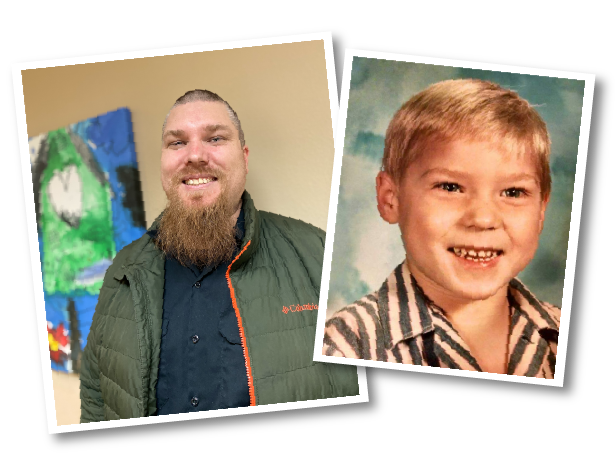
“My experiences pre-and post-adoption have, without a doubt, led to my career as a social worker today,” says Nick, a Wayfinder family finding social worker. When he was 2 years old, his biological parents left their apartment and never returned, abandoning him and his five older siblings.
Nick entered foster care. When he was 3 years old, he and his brother David* went to live with a family that already had one adopted son. Though the family adopted Nick when he was 7, David went to a group home because of his psychological issues. “We had no visits, no contact,” Nick says, “and I didn’t see him again till I was 19.”
Nick became very depressed. “Losing David made a big hole in me,” Nick recalls. “He had been with me through everything. I feel, had there been some kind of connection to my siblings, it would have filled that hole.”
Nick does not remember ever talking to a social worker or anyone asking him what he wanted. No one tried to put him in touch with his siblings. Because of this painful loss, Nick developed significant behavioral issues. “No one thought, maybe it’s because we sent his brother away and he never saw him again,” says Nick.
“When I decided to become a social worker, all those feelings came up,” Nick says. “I never wanted another kid to feel that they had lost their family, and there wasn’t anybody who cared to fix that.”
Nick explains that the child welfare system has evolved since the 1990s when he was cut off from his siblings. His own job is a reflection of the new emphasis on maintaining family ties for children in foster care.
When he was 19 years old, Nick got a phone call while he was working at a fast food restaurant. The caller said he was Nick’s brother. “I thought someone was messing with me,” Nick remembers. “Then they all showed up.” His four brothers had driven to the general area where they thought Nick lived and started asking people if they knew Nick. They got lucky when a store employee said he knew Nick and where he worked.
Nick’s reunion with his brothers in the restaurant was surreal. To them, they had found the baby brother who had been lost forever. “They said, ‘We love you. We miss you,’” Nick says. “I thought, ‘David, I love you and miss you, but I have no memory of the rest of you.’ I hadn’t even seen pictures.”
Today, Nick is in contact with some of his birth siblings, who lead complicated, difficult lives. None of them had a permanent home as a child, and they missed out on the love, permanence and opportunities he had. “I always have a soft spot in my heart for them,” says Nick. “If they need anything, I will help them.”
Nick’s childhood experiences make him a compassionate, committed social worker. “I want these kids to have contact with their siblings,” Nick says. “I don’t want any kids to feel that the social worker doesn’t care about what they want, or that they will never have contact with their family again.”
What is Family Finding?
As a family finding social worker, Nick conducts exhaustive searches to locate family and others close to children in foster care. The purpose is to build a support network for each youth that maintains their family ties. Many youth think their extended family has forgotten about them. But often, these relatives or family friends do not know how to search for the child or even that the child is in the foster care system. Nick facilitates phone calls
and meetings for youth with family members who want to be involved in the youth’s life.
*names and detail changed to protect privacy.
September 27, 2023


